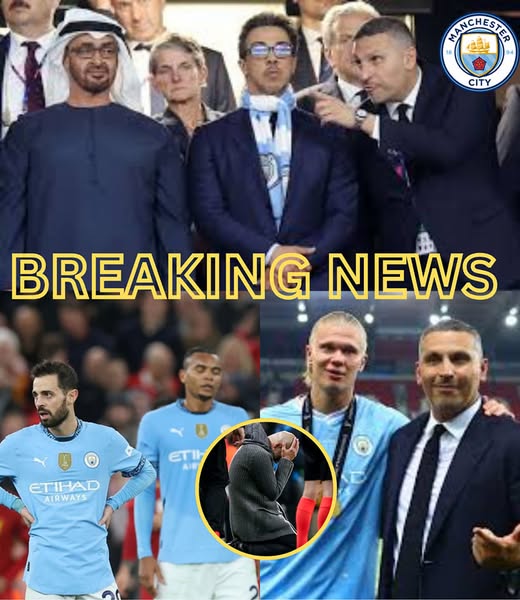Man City ‘hand Pep Guardiola £200m January transfer war chest’ as three world-class players

In the world of modern football, where tactical brilliance and consistent excellence have become synonymous with certain names, Pep Guardiola has long stood as the gold standard. The Catalan mastermind, whose philosophy has revolutionized the beautiful game across three different leagues, now finds himself navigating the most turbulent waters of his illustrious managerial career. For a man who has redefined success at Barcelona, Bayern Munich, and Manchester City, the current predicament represents not just a professional challenge, but a test of his very identity as one of football’s greatest tacticians.
The statistics paint a stark picture that would have seemed impossible just months ago. Guardiola has suffered five consecutive defeats for the first time in his managerial career—a streak that has sent shockwaves through the footballing world. This unprecedented run of failures has coincided with Manchester City conceding two or more goals in six straight matches, a defensive fragility not witnessed at the Etihad Stadium since 1963. These numbers represent more than mere statistics; they symbolize the crumbling of what many considered an impenetrable fortress of tactical superiority.
The Tottenham Humiliation: A Watershed Moment
The nadir of City’s current malaise was perhaps best encapsulated in their most recent Premier League encounter—a catastrophic 4-0 home defeat to Tottenham Hotspur. This wasn’t merely a loss; it was a comprehensive dismantling of everything Guardiola has built at Manchester City. The match served as a brutal reminder that even the most sophisticated tactical systems can unravel when confidence evaporates and momentum shifts decisively against a team.
The defeat to Spurs was particularly galling given the context. This was Manchester City on their own turf, in front of their supporters, facing a Tottenham side that, while talented, had shown inconsistency throughout the season. The 4-0 scoreline didn’t just represent goals conceded; it represented a systematic breakdown of City’s usually impeccable defensive structure, their trademark possession-based game, and their ability to control matches from the first whistle to the last.
For Guardiola, who has made his reputation on meticulous preparation and tactical perfection, the Tottenham defeat must have felt like watching his life’s work being deconstructed in real-time. The Spanish manager, known for his animated touchline presence and constant tactical adjustments, appeared increasingly helpless as his team surrendered goal after goal, each one a dagger to the heart of his carefully constructed philosophy.
The Historical Context of Guardiola’s Success
To truly understand the magnitude of this crisis, one must consider the extraordinary standards Guardiola has set throughout his career. Since taking his first managerial role at Barcelona in 2008, he has consistently operated at a level of excellence that has redefined what it means to be a successful football coach. His Barcelona team didn’t just win; they revolutionized the sport with their tiki-taka philosophy, turning football into an art form that combined beauty with devastating effectiveness.
At Bayern Munich, Guardiola faced the challenge of following the treble-winning Jupp Heynckes, yet he managed to maintain the club’s dominance while implementing his unique style. Although he didn’t achieve Champions League success in Germany, his impact on the team’s playing philosophy was undeniable, and his tactical innovations continued to influence coaches worldwide.
When Guardiola arrived at Manchester City in 2016, he inherited a team with potential but lacking the tactical sophistication and mental fortitude required for sustained success at the highest level. What followed was perhaps the most remarkable transformation in Premier League history. Guardiola didn’t just improve City; he created a footballing machine that operated with clockwork precision, breaking records and setting new standards for attacking football.
The numbers from his City tenure read like a fantasy: multiple Premier League titles, domestic cup victories, and a Champions League triumph that finally silenced his critics who questioned his ability to succeed without Lionel Messi. His teams regularly scored over 100 goals in a season, played with a possession percentage that often exceeded 70%, and created chances with a frequency that left opponents and observers alike in awe.
The Anatomy of a Crisis
The current crisis didn’t emerge overnight. Like many sporting downturns, it has been building gradually, with warning signs that perhaps only become clear in retrospect. The aging of key players, the departure of influential figures from the squad, and the natural cycle of football success have all contributed to City’s current predicament.
Central to City’s recent struggles has been their defensive vulnerability. A team that once prided itself on keeping clean sheets and controlling games through possession has become surprisingly porous. The statistic of conceding two or more goals in six consecutive matches isn’t just alarming—it’s completely contrary to everything Guardiola’s teams typically represent. His coaching philosophy has always been built on the principle that the best defense is a good offense, maintaining possession to prevent opponents from creating chances. When that system breaks down, as it clearly has in recent weeks, the consequences can be devastating.
The psychological impact of this run of defeats cannot be understated. Manchester City’s players, accustomed to winning and dominating matches, suddenly find themselves questioning their abilities and their methods. The confidence that once seemed unshakeable has been replaced by doubt, and doubt is perhaps the most dangerous enemy of any team that relies on intricate passing moves and split-second decision-making.
Moreover, the tactical adaptations that opponents have made to counter City’s style have become increasingly sophisticated. The Premier League’s other teams have had years to study Guardiola’s methods, identify weaknesses, and develop strategies to exploit them. What once seemed like an unstoppable system now appears to have been decoded by astute opponents who have found ways to disrupt City’s rhythm and expose their vulnerabilities.
Guardiola’s Response: Commitment Amid Chaos
In the face of this unprecedented challenge, Guardiola’s response has been characteristic of his personality and his approach to football management. Rather than seeking excuses or deflecting blame, he has doubled down on his commitment to Manchester City and his belief in his methods. His recent contract extension, signed just last month, was perhaps perfectly timed to demonstrate his faith in the project and his determination to overcome this difficult period.
“I don’t want to run,” Guardiola told Express.co.uk, words that encapsulate his character and his approach to adversity. “I want to be here and rebuild the team in many aspects from now until the end of the season and into next season.” This statement reveals several important aspects of Guardiola’s mindset. First, it shows his recognition that the current problems are not temporary blips but fundamental issues that require comprehensive solutions. Second, it demonstrates his willingness to take responsibility and lead the rebuilding process rather than abandoning ship when things become difficult.
The concept of rebuilding is particularly significant coming from Guardiola. Throughout his career, he has shown an ability to evolve and adapt his teams, never becoming complacent or assuming that past success guarantees future results. His acknowledgment that the team needs rebuilding “in many aspects” suggests a thorough self-evaluation that goes beyond tactical tweaks to encompass personnel, mentality, and perhaps even his own coaching methods.
The Financial Backing: A Vote of Confidence
Manchester City’s response to this crisis has been swift and decisive, demonstrating the club’s unwavering support for their manager. Reports suggest that Guardiola has been assured of significant financial backing to address the team’s shortcomings, with the initial promise of £100 million for January reinforcements reportedly being doubled to £200 million following the team’s recent struggles.
This level of financial commitment represents more than just monetary support; it’s a statement of faith in Guardiola’s ability to identify and solve the problems plaguing his team. In an era where managerial careers can be ended by a handful of poor results, City’s willingness to invest so heavily in Guardiola’s vision speaks volumes about their long-term confidence in his leadership.
The doubling of the transfer budget also reflects the severity of the situation. When a club increases its planned expenditure by 100% in response to poor form, it acknowledges that the problems run deeper than initially anticipated and require more comprehensive solutions than originally envisioned.
Strategic Targets: Building for the Future
The reported transfer targets provide fascinating insight into Guardiola’s diagnosis of his team’s problems and his vision for the future. The pursuit of Real Sociedad midfielder Martin Zubimendi for £60 million suggests a recognition that City’s midfield needs fresh impetus and perhaps a different dynamic from what currently exists in the squad.
Zubimendi represents the type of player Guardiola has always favored: technically gifted, tactically intelligent, and capable of operating in the complex positional play that defines City’s style. His potential arrival would not just add quality to the squad but could provide the creative spark and defensive stability that have been missing during this difficult period.
The interest in Sporting striker Viktor Gyökeres, valued at £65 million, indicates Guardiola’s awareness that City’s attacking options may need reinforcement. Despite having traditionally relied on false nines and fluid front lines, the pursuit of a more traditional striker suggests a potential tactical evolution in response to the current crisis. Gyökeres’ physical presence and goal-scoring ability could provide City with a different dimension in attack, offering alternatives when their usual intricate build-up play is being successfully disrupted by opponents.
Perhaps most intriguingly, the reported interest in Newcastle’s Bruno Guimarães for £75 million represents a significant statement of intent. The Brazilian midfielder has established himself as one of the Premier League’s most complete players, combining defensive solidity with creative flair and leadership qualities. His potential acquisition would address multiple needs simultaneously: providing defensive stability, creative impetus, and the kind of strong personality that can help rebuild confidence within the squad.
The Broader Implications
This crisis extends beyond Manchester City and Pep Guardiola; it has implications for the broader landscape of modern football. Guardiola’s methods have influenced an entire generation of coaches, and his current struggles raise questions about the sustainability of his intensive, possession-based approach. If the master himself is finding it difficult to maintain his standards, what does this mean for the countless disciples who have adopted similar philosophies?
The situation also highlights the cyclical nature of football success. Even the most successful teams and coaches face periods of difficulty, and how they respond to these challenges often defines their legacy. For Guardiola, this crisis represents an opportunity to demonstrate his adaptability and resilience, qualities that are just as important as tactical brilliance in determining long-term success.
The financial aspect of City’s response also raises interesting questions about the modern football economy. The willingness to invest £200 million to solve immediate problems reflects both the club’s resources and the pressure to maintain success in an increasingly competitive environment. This level of expenditure to address a temporary downturn illustrates how high the stakes have become in elite football.
Looking Forward: The Path to Redemption
As Guardiola and Manchester City navigate this unprecedented challenge, several factors will determine whether they can return to their previous heights. The January transfer window will be crucial, not just for the players they bring in but for how quickly these new additions can be integrated into the team’s system. Guardiola has always been meticulous about ensuring new signings understand his philosophy, but the current crisis may require a more rapid integration process than usual.
The psychological aspect of the recovery will be equally important. Confidence, once lost, can be difficult to rebuild, especially when every match is scrutinized and every mistake is magnified. Guardiola’s ability to restore belief within his squad while simultaneously implementing necessary changes will be a true test of his coaching abilities.
The tactical evolution that may emerge from this crisis could ultimately benefit both City and football more broadly. Guardiola has never been afraid to innovate, and this period of difficulty may force him to develop new approaches that once again revolutionize the game. His willingness to pursue different types of players suggests an openness to tactical adaptation that could yield exciting results.
Conclusion: A Defining Moment
Pep Guardiola’s current crisis at Manchester City represents more than just a poor run of form; it’s a defining moment in the career of one of football’s greatest coaches. How he responds to this unprecedented challenge will determine not only his immediate future but his lasting legacy in the sport.
The support shown by Manchester City, both in terms of contract extension and financial backing, provides Guardiola with the resources and time needed to address the team’s problems comprehensively. The reported transfer targets suggest a thoughtful approach to squad rebuilding that addresses both immediate needs and long-term planning.
Ultimately, this crisis may prove to be exactly what Guardiola and Manchester City needed. Success can breed complacency, and perhaps this period of struggle will reinvigorate both the manager and his players, reminding them of the standards required to compete at the highest level. If Guardiola can navigate these troubled waters and emerge stronger, it will add another remarkable chapter to an already extraordinary career.
The footballing world watches with fascination as one of the game’s greatest minds grapples with his biggest challenge. The outcome will not only determine Manchester City’s immediate future but could influence the direction of football tactics and management for years to come. In facing his first real crisis, Pep Guardiola has the opportunity to prove that true greatness is measured not just by success, but by the ability to overcome adversity and emerge stronger than before.















